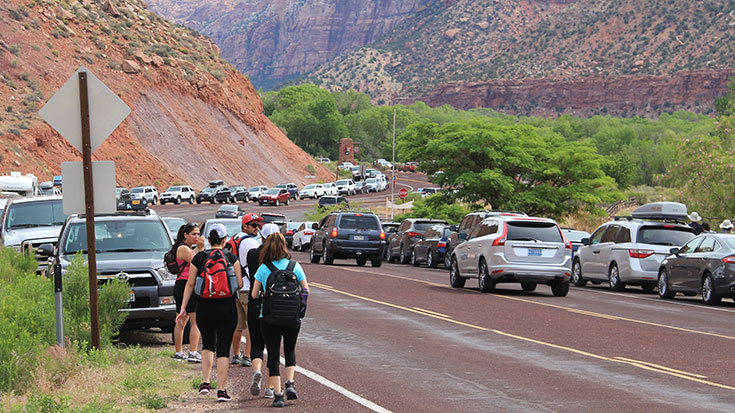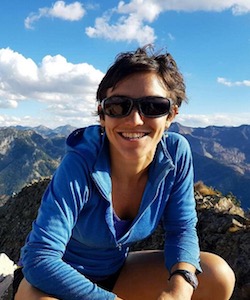By Danya Rumore for EDRBlog.org

Public policy challenges have a tendency to be somewhat overwhelming. People often don’t agree about the nature of the problem or what, if anything, should be done to address it. Even where there is agreement that there is a problem and it should be addressed, often public policy challenges—such as what to do about traffic congestion in Utah’s Cottonwood Canyons, regional air-quality issues, or wildfire risk—are so complex that solutions seem elusive. Understandably, this can lead to significant conflict, apathy, and/or simply a lack of meaningful action.
As I wrote about in my previous EDR Blog on “The Power of Creative Tinkering and Creative Problem Solving,” my experience suggests that creativity and collaboration are two critical agreements for breaking the impasse and fostering positive movement on seemingly intractable issues. Problematically, as I said and as I still believe to be the case:
Unfortunately, there are rarely forums in which truly creative, joint problem solving, and the “freewheeling” brainstorming it requires, can occur. Stakeholders often do not have an opportunity to come together as peers to envision creative approaches for addressing shared challenges. Even when they do, public officials and involved parties often feel they need to toe the party line or carefully chose their words, lest they come back to bite them. Such issues are commonly further exacerbated by a lack of trust and fear.
Get notified when new articles are posted to the EDR blog – sign up for our email list »
As I explained in that blog, this is why colleagues and I have been experimenting with “devising seminars” as a collaborative problem-solving approach. Devising seminars are off-the-record, professionally facilitated, face-to-face problem-solving sessions that engage participants in their personal, instead of professional, capacity. Rather than trying to reach agreement on solutions, participants are asked to generate “good ideas” that can win support from all key stakeholder groups. Devising seminars aim to create a space for constructive dialogue among a mix of stakeholders who otherwise would not have an opportunity to engage in face-to-face problem solving and to cultivate a space for freewheeling brainstorming and co-creation of innovative solutions.
In October 2019, the EDR Program partnered with the Utah Office of Outdoor Recreation, Office of Tourism, and Public Lands Policy Coordinating Office to convene a devising seminar on “Visitation on Utah’s Public Lands: Preserving our Past and Forging our Future.” Utah has become an increasingly popular place to live and visit in large part as a result of our highly desirable outdoor recreation opportunities, particularly those on state and federal public lands (such as our “Mighty 5” national parks). This has resulted in a variety of impacts on our public lands as well as nearby communities throughout the state, ranging from degradation of natural resources to congestion in and around recreation hotspots. While there seems to be widespread agreement about the value and benefits of recreation and the need to address the related impacts, there has thus far been a fair amount of conflict about what should be done, which has limited progress in addressing issues.
The Visitation on Utah’s Public Lands devising seminar aimed to break this impasse through bringing together diverse stakeholders to identify creative and actionable high-level strategies for addressing visitation-related impacts while protecting the visitor experience and accessibility of public lands throughout Utah. In advance of the workshop, I conducted informal interviews with 19 diverse stakeholders to get a sense of the diversity of concerns, interests, and perspectives about visitation on public lands in Utah. The information interviewees shared was used to frame and inform the design of the workshop. Since the goal of the workshop was to generate good ideas and not to make commitments, participants were asked to engage on equal footing rather than in their official capacities. They were also asked to generate ideas that would be acceptable to their own constituents while concurrently addressing the concerns of other stakeholder groups. To create a space where people could engage honestly and creatively, interviews and workshop proceedings were “off the record,” meaning no particular perspectives were attributed to particular individuals.
The devising seminar resulted in three main “good ideas” that participants thought could gain widespread buy-in and meaningfully address recreation-related impacts on public lands while protecting the visitor experience:
- Good idea 1: Develop a statewide technical assistance program to support regional recreation planning
- Good Idea 2: Foster statewide public-private partnerships to address recreation infrastructure and management needs
- Good Idea 3: Work together on a statewide stewardship pledge and statewide stewardship messaging and marketing
Further explanation of these ideas, suggested next steps, and the full recap of the devising seminar are available in the workshop summary.
These ideas are now feeding into efforts to develop a statewide outdoor recreation strategy as well as being advanced through a variety of other means. While the next few years will tell how much impact the devising seminar will have, it is already clear that the effort has started to change the conversation about recreation on public lands and to inspire meaningful action.
I have long believed that devising seminars and similar approaches that create space for people to come together to engage in brainstorming without having to commit to any course of action have considerable potential for helping us address complex and even seemingly intractable public policy issues. My experience with the Visitation on Utah’s Public Lands devising seminar has further reinforced this belief and confirmed my hypothesis that this approach can be meaningful at various levels of decision making, from international (see here for an example) to regional and local. In so doing, it drove home a few key lessons:
- A devising seminar can be done in just a half-day, which I worried would not be enough time. That said, this requires doing substantial work prior to the event, including a thorough situation assessment. In general, I would advise setting aside at least a full-day—or longer if participants need briefing and time to build relationships before engaging productively.
- It is critical to conduct a situation assessment (i.e., confidential interviews with a diverse range of stakeholders) in advance of the workshop. The assessment informed how we framed the workshop to make it inviting to a diverse group of stakeholders; it allowed me to “name and claim” concerns and problems at the start of the workshop so we could focus our time not on rehashing issues but instead co-creating soliutions; it helped us figure out who to invite to the workshop; and it allowed me to seed the conversation with a few potential “good ideas” that had been mentioned by numerous interviewees, which was key to reaching agreement on good ideas within our limited time. Such an assessment also importantly helps the facilitator build trust with participants and understand their needs and concerns.
- It is invaluable to have the “right” people in the room. When selecting particiapnts for the devising seminar, the conveners and facilitator carefully identified individuals representing a diverse range of interests and perspectives who we also thought could engage productively and creatively. This resulted in a mix of people who could think about issues from many different sides while still working together to co-create potential solutions.
- Finally, this experience drove home for me how important it is that the conveners of devising seminars be committed to the process and helping to move the good ideas that come out of it forward. While all participants in a devising seminar can help advocate for the ideas that come out of the process, having conveners who are willing to move these ideas into official decision-making spheres champion the process can be enormously helpful for maintaining momentum. The success of this process was in large part a result of the commitment of the Office of Outdoor Recreation, Office of Tourism, and Public Lands Policy Coordinating Offices to create a space for collaborative brainstorming and to get the right people to the table.
Going forward, I hope to have the opportunity to catalyze and facilitate devising seminars on a range of challenging public policy issues and I encourage conveners and facilitators to advocate for using this approach. Further, I hope Utah’s work on addressing recreation impacts on public lands is an inspiration for similar collaborative efforts in other states.
We encourage anyone who has experience with devising seminars or other creative problem-solving approaches to to share your stories with us and our readers via the EDR Blog!
 Danya Rumore, Ph.D., is the Director of the Environmental Dispute Resolution Program in the Wallace Stegner Center, a Research Associate Professor in the S.J. Quinney College of Law, and a Research Assistant Professor in the City and Metropolitan Planning Department at the University of Utah’s. She teaches about, practices, and conducts research on negotiation, dispute resolution, leadership, and collaborative problem solving.
Danya Rumore, Ph.D., is the Director of the Environmental Dispute Resolution Program in the Wallace Stegner Center, a Research Associate Professor in the S.J. Quinney College of Law, and a Research Assistant Professor in the City and Metropolitan Planning Department at the University of Utah’s. She teaches about, practices, and conducts research on negotiation, dispute resolution, leadership, and collaborative problem solving.
